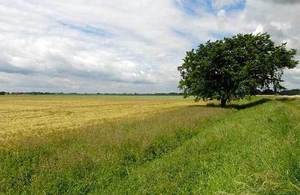Elizabeth Truss: Healthy environment integral to healthy economy
The Environment Secretary says the UK’s £100 billion food and farming sector needs a healthy and clean environment to be at its most productive.

A healthy environment is integral to a healthy economy, the Environment Secretary said as she set out her vision for the environment in a key-note speech.
Elizabeth Truss said the UK’s £100 billion food and farming sector – bigger than cars and aerospace combined - needs the environment to be healthy and clean if it is to be at its most productive. She highlighted the importance of the £210 billion rural economy to Britain and look at how scientific innovation and environmental improvements are at the heart of growth.
As part of ensuring our environment remains a strong part of the economy, the government is launching the first ‘pollinators strategy’ which will see more funding made available to farmers and landowners that take steps to improve the conditions for bees and other pollinating insects that fertilise plants to grow crops, fruits and seeds. They provide services worth £430 million to the economy, and our arable and horticultural industries are dependent on them.
Environment Secretary Elizabeth Truss said:
Our health, our jobs and our future prosperity and security depend on nature in this country remaining clean, healthy and beautiful – a place where families want to visit and rural businesses can grow as part of our long term economic plan.
That is why we have taken action with cleaner water, cleaner air and the planting of eight million trees. This healthy environment is vital for securing a better future - keeping the countryside a living place and an economic success story.
In a speech, she set out the actions the government has taken to champion the rural economy:
- Opening up new markets for food exports - signing more than 600 deals with more than 100 countries since 2010 and cutting the number of Defra regulations affecting food and farming by a fifth since 2011.
- Setting up dedicated rural broadband and mobile programmes to reach parts of the country with poor connections - 40,000 homes and businesses every week are now gaining access to superfast broadband.
- Boosting tourism - visitors to the countryside spend an estimated £8.4 billion a year.
The government will use the latest technology to gather scientific evidence on what conditions are now and how to measure changes in the environment. The new Copernicus satellite system will monitor air quality down to regional level, monitor the health of the sea and habitat change. It will help farmers to work out when the best time is to sow crops in their region.
The Pollinator Strategy looks at how the everyone can play their part in supporting bees and other ‘pollinators’ – insects that fertilise plants to grow fruits and seeds. There are at least 1,500 species of these insects: wild bumble bees, moths, butterflies, wasps, beetles, hoverflies and the honey bee.
Farmers are being encouraged to provide the food and habitat pollinators need on their land through a new Countryside Stewardship scheme, supermarkets including Waitrose have been distributing bee-friendly flower seeds to their customers.